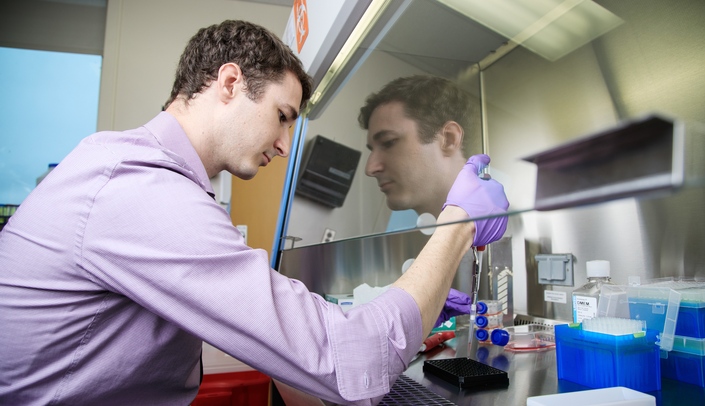For Sean Watson, the Nebraska INBRE program is the biggest single contributor to his success.
"Out of all the things I have done, INBRE is the one thing that has directly led me to pursue a career in research," Watson said.
A 2017 INBRE Scholar, Watson graduated from the University of Nebraska-Lincoln with degrees in molecular and biomedical biology and economics and is pursuing a doctoral degree at Harvard University.
On his drive back from Boston, Mass., where he recently secured housing for his wife, black lab and himself, Watson discussed why he wanted to pursue a doctoral degree at Harvard.
"The degree is in the school of public health, which compliments my interests in drug development and Harvard has a really diverse public health program," Watson said.
He said he is particularly interested in drug development research around TB, gonorrhea and malaria.
Watson saw first-hand how devastating parasitic disease is after spending time in Southeast Asia in countries like Thailand, Cambodia, Laos and India.
During his time in the INBRE program, he worked with Paul Davis, Ph.D., an associate professor of biology at the University of Nebraska at Omaha, whose research focus is on Toxoplasma gondii, which is genetically similar to the parasite that causes malaria.
"I know how much diseases like malaria affect developing nations and saw how it affects children in the countries I visited," he said. "I want to do research that has an impact on people’s lives in a positive way."
His goal, he said is to work in academic research where he is free to pursue this type of research.
"It could either be in drug development or developing new diagnostic tools that helps to monitor the spread of disease and predict resistance as it spreads throughout the globe and be proactive about fighting it before it becomes a big problem," Watson said.
Watson said he also hopes to explore microbiology, bacteriology and bioinformatics during his graduate education.
During their first year at Harvard, Watson said graduate students are given the opportunity to rotate through three or more different labs in order to find one that fits their academic interest as well as personal style. Each rotation lasts two to four months and gives the students an idea of the lab atmosphere and available projects.
"Some students might join a lab whose scientific goals match their own, but through INBRE I learned that choosing a P.I. that fits one’s personality is just as important as choosing a research topic that is interesting," he said.
Watson said the people he met as an INBRE Scholar have made a huge impact on his life by helping him prepare a CV for graduate school and providing insight on what to expect as a graduate student.
"It has changed my life for the better," Watson said of the program.
